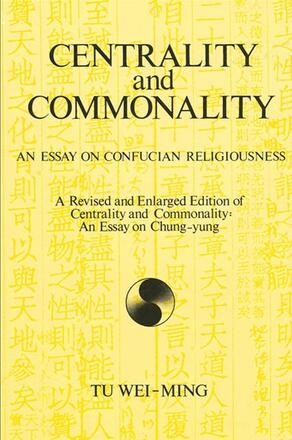
Centrality and Commonality
An Essay on Confucian Religiousness A Revised and Enlarged Edition of Centrality and Commonality: An Essay on Chung-yung
Alternative formats available from:
Tu Wei-ming is Professor of Chinese History and Philosophy at Harvard University. His many books include Neo-Confucian Thought in Action: Wang Yang-ming's Youth (1976); Centrality and Commonality: An Essay on Chung-yung (1976); Humanity and Self-Cultivation (1979); Confucian Ethics Today: The Singapore Challenge (1984); and Confucian Thought: Selfhood as Creative Transformation (1985). He is on the editorial boards of the Harvard Journal of Asiatic Studies, Asian Thought and Society; Philosophy East and West; and Chinese Cultural Quarterly. He has also contributed to Journal of Asian Studies; The Humanities; Monist; and Daedalus.
Reviews
"It is a spectacular example of the Confucian commentarial tradition at its best. Tu manages to elucidate the original text while building on it in new and exciting ways. He has a clear grasp of the inner logic which is the engine of Chung yung's thought, and best of all, he is able to communicate it clearly in his own text. It is impossible to think about teaching a class in early Confucian thought without recommending this book. If it were a graduate class, Centrality and Commonality would have to be required reading. (Because) it is extraordinarily lucid about a very difficult topic, I wouldn't hesitate to use this book in an undergraduate class (as well). " — Warren G. Frisina, Rice University
"This kind of interpretative essay is precisely what is needed to persuade Western philosophers and general humanists to take the Chinese texts seriously as a resource for alternative conceptual structures. Tu's main contribution lies in the quality of his insight into the important differences between 'person,' as defined in the Confucian context, and the dominant Western understandings. Given the ease with which it reads, I would target this work for classroom use. " — Roger T. Ames, University of Hawaii
"Tu is to be commended for bringing the rich resources of Chinese thought and culture into the midst of modern discussions that simultaneously encompass and transcend diverse cultures and their values within the scope of common human issues. He boldly confronts the seminal crisis of our times and amply demonstrates his ability to bring an insightful, creative intellect to bear upon the questions posed. In addition, his depth of personal commitment to the subject is very much in evidence and enriches this scholarly study with a unique dimension of human-ness. " — Sandra A. Wawrytko, San Diego State University
"Tu amplifies and clarifies the key patterns of thought in the text and succeeds in interweaving them into a richly textured and holistic Confucian Weltanschauung. I like the book because it is provocative. Tu's interpretation challenges the conventional wisdom that Confucianism is a purely rational and secular ethical system. His style is lucid—although the subject is both complex and difficult—and any intelligent general reader would enjoy the work and learn a great deal. " — Leo S. Chang, Harvard University